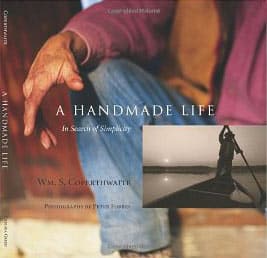
Bill Coperthwaite dove into indigenous crafts and brought the yurt to America. He lived sustainably on land in Maine and wrote the beautiful book, A Handmade Life: In Search of Simplicity.
I read the book looking for a how-to of sustainable living. What I received, instead, was an extended poem of simplicity that imparted the flavor of the pace of his life, the wind in the trees, the grace of his yurts, his thoughts on educating children. I was also invited into a new concept for me, the thought of “democratic technology”, by which he meant technology that anyone could use to build what they need. For example, the book contains a diagram that illustrates how to build a “democratic axe” and a “democratic chair”. Though the chair and the axe are a little ugly from my perspective, their beauty comes from the fact that anyone could build them with limited expertise and equipment — that is, they are democratic objects.
He also got me thinking about a new field, the field of life design: the intentional design of a whole life. In my mind, Bill joins others who have come before us who lead the way and inspired by example. They include Thoreau, Scott and Helen Nearing, Eliot Coleman, and so many others. Bill and these other life design faculty have taught us much about what we’ll need to thrive on one planet. Thank you Bill. We will miss you.
For a reminiscence honoring Bill, see this beautiful article by his friend and collaborator, Peter Forbes. Peter Forbes, in collaboration with his wife, Helen Whybrow, has written a book about Bill’s life and work that is also highly recommended. It is in this book that Peter and Helen tell the story of the lineage of a wooden spoon that extends from Gandhi through Richard Gregg, the Nearings, Bill, and then Peter Forbes.